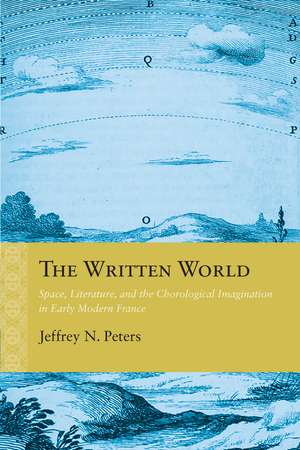The Written World: Space, Literature, and the Chorological Imagination in Early Modern France: Rethinking the Early Modern
Autor Jeffrey N. Petersen Limba Engleză Paperback – 15 mai 2018
In The Written World: Space, Literature, and the Chorological Imagination in Early Modern France, Jeffrey N. Peters argues that geographic space may be understood as a foundational, originating principle of literary creation. By way of an innovative reading of chora, a concept developed by Plato in the Timaeus and often construed by philosophical tradition as “space,” Peters shows that canonical literary works of the French seventeenth century are guided by what he calls a “chorological” approach to artistic invention. The chorological imagination describes the poetic as a cosmological event that gives location to—or, more accurately, in Plato’s terms, receives—the world as an object of thought.
In analyses of well-known authors such as Corneille, Molière, Racine, and Madame de Lafayette, Peters demonstrates that the apparent absence of physical space in seventeenth-century literary depiction indicates a subtle engagement with, rather than a rejection of, evolving principles of cosmological understanding. Space is not absent in these works so much as transformed in keeping with contemporaneous developments in early modern natural philosophy. The Written World will appeal to philosophers of literature and literary theorists as well as scholars of early modern Europe and historians of science and geography
In analyses of well-known authors such as Corneille, Molière, Racine, and Madame de Lafayette, Peters demonstrates that the apparent absence of physical space in seventeenth-century literary depiction indicates a subtle engagement with, rather than a rejection of, evolving principles of cosmological understanding. Space is not absent in these works so much as transformed in keeping with contemporaneous developments in early modern natural philosophy. The Written World will appeal to philosophers of literature and literary theorists as well as scholars of early modern Europe and historians of science and geography
Preț: 305.47 lei
Nou
Puncte Express: 458
Preț estimativ în valută:
58.45€ • 61.35$ • 48.52£
58.45€ • 61.35$ • 48.52£
Carte indisponibilă temporar
Doresc să fiu notificat când acest titlu va fi disponibil:
Se trimite...
Preluare comenzi: 021 569.72.76
Specificații
ISBN-13: 9780810136977
ISBN-10: 081013697X
Pagini: 272
Ilustrații: 9 b-w images
Dimensiuni: 152 x 229 x 16 mm
Greutate: 0.37 kg
Editura: Northwestern University Press
Colecția Northwestern University Press
Seria Rethinking the Early Modern
ISBN-10: 081013697X
Pagini: 272
Ilustrații: 9 b-w images
Dimensiuni: 152 x 229 x 16 mm
Greutate: 0.37 kg
Editura: Northwestern University Press
Colecția Northwestern University Press
Seria Rethinking the Early Modern
Notă biografică
JEFFREY N. PETERS is professor of French and Francophone studies at the University of Kentucky.
Cuprins
INTRODUCTION • 1
On Poetic Becoming in the Seventeenth Century
CHAPTER 1 • 46
Everything in its Right Place: Location and Geography in Boileau’s Art poétique
CHAPTER 2 • 96
Lucretius and Cosmogenesis in La Fontaine and Molière
CHAPTER 3 • 149
The Invention of Pierre Corneille: Place and the New
CHAPTER 4 • 193
Racine and the Geography of Becoming
CHAPTER 5 • 249
Landscape and the Poetic Event in Honoré d’Urfé’s L’Astrée
CHAPTER 6 • 299
The World Written Out: Space and Description from Madeleine de Scudéry to the Princesse de Clèves
CONCLUSION • 349
The Chorological Early Modern
Bibliography • 363
On Poetic Becoming in the Seventeenth Century
CHAPTER 1 • 46
Everything in its Right Place: Location and Geography in Boileau’s Art poétique
CHAPTER 2 • 96
Lucretius and Cosmogenesis in La Fontaine and Molière
CHAPTER 3 • 149
The Invention of Pierre Corneille: Place and the New
CHAPTER 4 • 193
Racine and the Geography of Becoming
CHAPTER 5 • 249
Landscape and the Poetic Event in Honoré d’Urfé’s L’Astrée
CHAPTER 6 • 299
The World Written Out: Space and Description from Madeleine de Scudéry to the Princesse de Clèves
CONCLUSION • 349
The Chorological Early Modern
Bibliography • 363
Recenzii
“The most fundamental contribution of this book is its demonstration of how seventeenth-century French literature relates to the material world . . . The Written World has many affinities with the emerging field of environmental humanities. In this respect as well, Peters is a trailblazer and has opened up a new line of inquiry for seventeenth-century French studies.”—Lewis C. Seifert, author of Manning the Margins: Masculinity and Writing in Seventeenth-Century France
“Jeffrey Peters’s new book boldly confronts and explores what has long been hidden in full sight: the crucially important dimension of space in early modern French literature. Geography, landscape, modern urbanism, the significance of major and minor displacements—these facets of culture come into sharp focus in Peters’s study. A must-read for all those interested in the French literary tradition.” —John D. Lyons, author of Tragedy and the Return of the Dead
"What is the relation between literature and the world? In The Written World, Jeffrey Peters vigorously unsettles some answers to that old question. Puncturing a number of critical assumptions about spatiality, Peters turns to various philosophically-engaged figures of space, from Plato to Deleuze, as a way to read the scene of literature’s making. In a set of surprising readings of the seventeenth-century canon, Peters stitches together an argument about fiction and geography, travel and the imaginary, and the place of rhetoric in classical texts. La Fontaine spoke of his fables as figuring 'a certain philosophy—subtle, engaging, and bold'—the same is amply true of this brilliant book. The world is better off for having Jeffrey Peters write in it." —Katherine Ibbett, author of Compassion’s Edge: Fellow-Feeling and Its Limits in Early Modern France
Descriere
In The Written World, Jeffrey N. Peters argues that geographic space may be understood as a foundational, originating principle of literary creation. By way of an innovative reading of the Platonic concept of chora, Peters shows that canonical literary works of the French seventeenth century are guided by what he calls a “chorological” approach to poetic invention.














